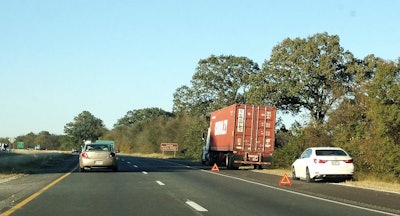
If Republican leadership moves it through, says Joe Rajkovacz, former owner-operator and current government affairs director for the Western States Trucking Association, an amendment to the House highway bill may make it to the floor this week relative to interstate trucking prices, routes and services — and, ultimately, driver pay.
Yes, those prior elements, many of you will recall, are what the 1994 Federal Aviation Administration Authorization Act (the F – four – A, as many people call it) specifies for federal preemption of any state law relative to trucking operations. From the U.S. Code of Federal Regulations today: “a State, political subdivision of a State, or political authority of 2 or more States may not enact or enforce a law, regulation, or other provision having the force and effect of law related to a price, route, or service of any motor carrier … or any motor private carrier, broker, or freight forwarder with respect to the transportation of property.”
A court decision last year in favor of enforcement of California’s requirement for interstate driver compensation for state-mandated meal and rest breaks has brought a different interpretation of the federal law to the fore as it relates to driver pay that Rajkovacz believes any small fleets in the audience paying drivers with percentage- or mileage-based methods ought to be paying close attention to. The amendment itself purports to be an effort to reiterate and reinstate what the writers view as the original intent of the FAAAA.

After a brief introduction, Rajkovacz spells out the issues in the podcast here, excerpted from his talk to the attendees of the National Association of Small Trucking Companies in Nashville, Tenn., on Friday this past week.
Podcast: Play in new window | Download
For more, catch the tail end of the House Transportation and Infrastructure Committee’s markup session Oct. 22, in which Rep. Jeff Denham (R-Calif.) speaks about the amendment as one that would return established interpretation of the FAAAA to law. The 9th Circuit Court of Appeals’ decision in Dilts v. Penske has introduced a situation where it’s next to “impossible to comply with current law,” Denham says, particularly for out-of-state carriers delivering to California but also within the state, likewise opening the door for other challenges to trucking companies’ wage practices in other states.
Read more about the decision in this past story from Overdrive.
Influential ranking committee member and Rep. Peter Defazio (D-Ore.), meanwhile, expressed support for the amendment at the markup hearing, noting that there has “definitely been confusion created by the circuit court…. Are [drivers] on the state clock or the federal clock?” He went on to say that “we should look for a way that’s very targeted” to approach fixing the problem.
“We’re still searching for that rifle shot approach that will solve the problem” and not create others, he added.
We’ll keep up to date on whether the amendment is ultimately adopted as part of the overall bill should it see the light of day. Meanwhile, tune to the markup video below at the 5:09:00 mark for the brief discussion.
[youtube 99KuKrsrTMA nolink]











